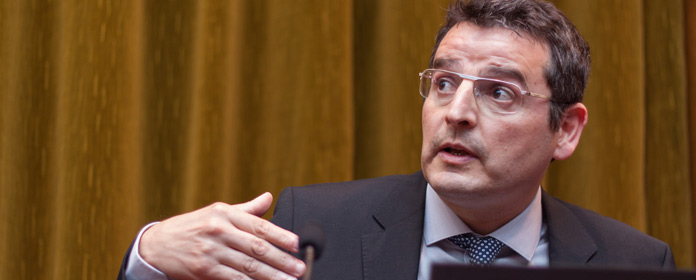"The Master's Degree in research Biomedical is an important intermediate step for students to choose their professional future well"
- The prestigious oncologist Josep Domenech closes the VII edition of the MIB, which has had 27 students.

PHOTO: Manuel Castells
Josep Domingo Domenech, oncologist researcher at Mount Sinai Hospital in New York since 2012, where he is also a professor at department of Pathology, has attended the closing of the Master's Degree in research Biomedical of the University of Navarra, where he has told his experience in the U.S. and has stated that cancer, in the next 10 or 15 years, will undergo a real revolution in its treatment, thanks to the sequencing of the genome of tumors.
Present at his lecture were the 27 graduates of the seventh graduating class of Master's Degree, as well as alumni from other graduating classes, new students and professors and researchers from campus.
Josep Domenech has received this year the recognition of the newspaper Expansión as one of the Spanish scientists with more projection, on the occasion of the thirtieth anniversary of the newspaper.
- Could you briefly explain what are your main projects at research at Mount Sinai Hospital in NY?
The research projects that I direct are mainly focused on dissecting the cellular and molecular mechanisms that confer aggressiveness to tumor cells, mainly in prostate cancer. Two examples of recent discoveries resulting from this research are, on the one hand, how tumor stem cells contribute to the acquisition of resistance to chemotherapy and, on the other hand, how the transcription factor GATA2 acts as a master gene that regulates the aggressiveness of prostate cancer. Through these programs of study we are identifying new targets and therapeutic strategies to treat cancer more effectively.
- Why did you decide to develop your degree program in the USA?
After my post-doctoral training at Columbia University I was given the opportunity to direct my own group of research at department Pathology at Mont Sinai Hospital, and to fully dedicate my professional degree program to research cancer. I could not refuse, as biomedical research is a passion of mine. In addition, the research system in the USA gives you enough economic facilities to develop your ideas, it is very meritocratic and makes you have to give your best at all times.
- In your opinion, what plus does the Master's Degree in research offer in the training of its graduates?
The Master's Degree in research Biomedical gives students the opportunity to test whether they like the work of day-to-day work in a laboratory. It also allows them to discern which area of research they would like to devote their efforts to during their own 5 years in a doctoral program. It is an important intermediate step for the student to make the right choice for their future career.
- What advice would you give to a graduate or student senior who is considering what to do to focus their degree program towards the research medical ?
To be patient, tenacious, and committed to the research you are pursuing. Competitively pursuing biomedical research at a global level requires being very prepared and knowing how to manage frustration. Also, in today's world, where there are many distractions and a lot of superficiality, it is very important to find time and space to be quiet and meditate in order to reflect and generate new ideas.
- In your case, you have focused on research in prostate cancer. Do you see a cure for this tumor and for other cancers relatively close to finding ? Where would you say the major findings in this field will be in the next 10/15 years?
Yes, I believe that prostate cancer and other tumors can be cured in the next few years. Recent sequencing of the tumor genome has allowed us to identify the genes and signaling pathways (pieces of the puzzle) critical to driving cancer aggressiveness. In the next 10/15 years we will witness the assembly of this puzzle, which will allow us to develop more effective treatments and therapeutic strategies and potentially cure the disease.
Biography
Josep Domenech graduated in Medicine and Surgery from the University of Barcelona. For six years he worked at the Hospital Clinic of Barcelona. In 2007 he obtained his PhD and the topic of his research, which had already focused on prostate cancer, opened the doors to a postdoctoral stay at Columbia University, at its laboratory of Pathology and Cell Biology. Since 2012 he has been working at one of the most prestigious hospitals in the world, Mount Sinai, where he directs a group of researchers studying the cellular mechanisms of aggressiveness and resistance to therapies in urogenital tumors, mainly prostate and bladder.




